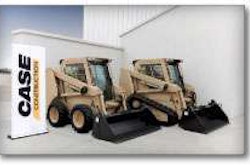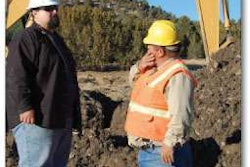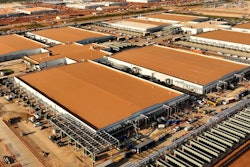Watching his family and business grow has led to the good years for this excavation contractor.
By Glenn DiNella
R.D. Jones Excavating
Year started: 1977
Annual volume after first year: $20,000 to $30,000
Annual volume today: $13 million
Markets served: Utility, road and public construction.
A lot of companies claim they are like a family, but R.D. Jones Excavating can make that claim legitimately. Like many contractors, Randy Jones, owner and president of the company, grew up around the business. His father, Ralph, worked for a paving company.
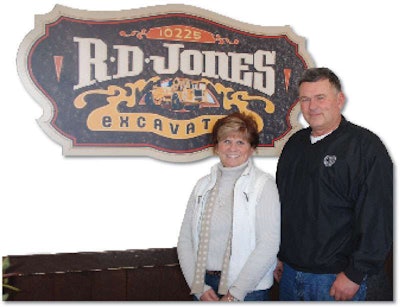 Dana and Randy Jones
Dana and Randy Jones“When I was 10 years old I would ride to work with my dad three or four times a month,” Jones says. “By 17, I operated a road grader and an asphalt paver.” Jones shrewdly noticed the paving company was often looking to rent a small dozer. So at the age of 19, using money given to him by a favorite uncle, he purchased a used Caterpillar D4 bulldozer and a used dump truck and trailer to haul it.
Today, Jones estimates he has completed more than 1,000 major excavating projects in the vicinity of Harrod, Ohio, where he grew up. In addition to his family and staff, he bases his success on commitment to three essential elements: quality, efficiency and scheduling. “Our commitment to our clients is to maintain the highest level of quality while delivering cost efficient results and meeting the most demanding schedules,” he says.
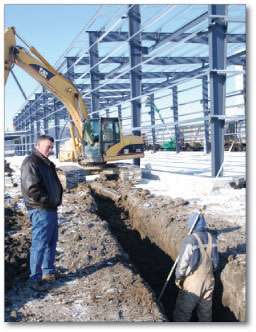 Jones discusses a pipe-laying project with his son, Travis.
Jones discusses a pipe-laying project with his son, Travis.Jones’ wife, Dana, is secretary for the company, dedicating most of her time to scheduling. Dana is assisted by a full time office manager, Christal Ford, whose duties include prompt processing of invoices and payroll. Jones doesn’t operate the equipment much anymore, instead handling the myriad duties that come with operating an excavating company with annual revenues near $13 million. “Owners in this business need to be in the office every day,” he advises. “You don’t need to be out on the golf course.”
Jones, however, does still relish getting out to the jobsites. It gives him the opportunity to visit with two of his sons who work for him. “My sons are like me,” he says. “They love outside work. They don’t want to be in an office.” Trevor, 32, is a project superintendent charged with heading up one earthmoving crew and directing the daily operations on various projects, including an underground utility crew. Travis, 27, is a project superintendent in charge of a second earthmoving crew and also typically handles several smaller projects. Another son, Troy, 30, operates the Jones Land and Cattle Company – Jones’ lifelong hobby of breeding Angus and Maine Anjous cattle has in recent years has grown into a profitable division. “Watching my kids grow up and play football and basketball – I thought those would be the great years,” Jones says. “But I think it’s even better watching them now, getting into the business. I get to see them and talk to them every day. Now are the good years.”
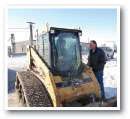 Jones with his oldest son, Trevor.
Jones with his oldest son, Trevor.Jones also employs an experienced staff of laborers, operators and a project estimator. His two mechanics are both fully equipped with their own service truck complete with welding equipment and a 10,000-pound crane. “When I get to 50 employees, that’s as big as I want to be,” Jones says. “Fifty just seems to be the magic number for this area. If I get down to 45, I can always find a few more skilled guys. If I get more than 50 I don’t get the quality. If it weren’t for my two boys I wouldn’t get that big.” In addition to a first rate pay scale, Jones offers employees health insurance and a 401k match up to 5 percent.
Multiple markets
Jones says when he first began excavation he stayed busy digging hundreds of residential and farm ponds for area farmers. These days he is more likely to do public projects, including school construction, street reconstruction, waterlines, storm and sanitary sewers. Commercial clients include weighty names such as Proctor and Gamble, Honda, Walmart, Lowe’s, National Lime and Stone and general contractors such as Peterson, Tuttle, Ferguson and Thomas and Marker.
One recent successful project was excavating the site for a 750,000-square-foot Home Depot distribution center in nearby Van Buren, Ohio. “Everything just clicked on that one,” Jones recalls. “I don’t drive equipment much anymore, but I went to this job every day. Travis and Trevor were both on this job for a month and a half. We moved 400,000 yards of dirt in 30 days and we finished ahead of schedule.
“Every company needs to find their own niche,” he continues. “Ours is excavating 20 feet or less. Actually, we prefer to stay above 15 feet since that’s where we seem to make more money. We like to sub out any deep digging and boring for sewer and utilities.”
Lean years
The recent flat economy makes Jones recall the early 1980s. “Interest rates were 20 percent,” he says. “Inflation took off. Our guys had to wait a week or two to get their paycheck. A couple of times we had to siphon diesel out of one of our dump trucks to put into some other equipment to finish the job. Then we’d siphon fuel back into the dump truck to get to the next job.”
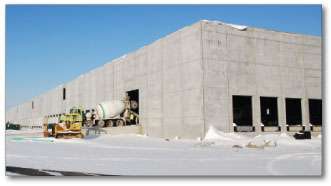 This Home Depot distribution center in Van Buren, Ohio, involved digging a 25-acre retention pond running the length of the property. Jones says it was a balanced site, where no dirt was hauled in or out – a cost that can add up quickly. When he does need to acquire dirt for a project, he often finds a local farmer who is willing to let him dig a small pond in exchange for the soil.
This Home Depot distribution center in Van Buren, Ohio, involved digging a 25-acre retention pond running the length of the property. Jones says it was a balanced site, where no dirt was hauled in or out – a cost that can add up quickly. When he does need to acquire dirt for a project, he often finds a local farmer who is willing to let him dig a small pond in exchange for the soil.The gas prices of 2009 were also troubling for Jones. Jobs bid earlier that year used a fuel price estimate of two dollars per gallon. “In August we were paying $4.01. And each machine was using 200 gallons per day. That’s 5,000 to 6,000 gallons of fuel, which meant a $10,000 deficit every day. That took the fun out of it. But you can’t bid based on predicting an increase, because you’ll never get the job.”
The off season
Ohio winters can be harsh, but Jones keeps as many operators employed as possible. “If it warms up we’ll call a few guys back to lay pipe,” he says. “If we don’t get a good snow to provide insulation, the ground can freeze 18 inches down.” He says it’s like trying to excavate rock. To keep his men and equipment employed Jones takes on snow removal jobs, but his jobs are bigger than residential driveways. He keeps 16 pieces of equipment deployed at the Proctor and Gamble operation in Lima, Ohio. Three front end loaders equipped with 18-foot snow boxes, three skid steers, three backhoes, three graders, three tractors with boxes and blades, plus a dump truck are all needed to remove snow from their paved 118 acres. “For safety reasons, they want to see black top all the time,” Jones says.
Safe at home
In the past year and a half, R.D. Jones has had no accidents – with more than 279,673 man hours worked, a result of the company’s extensive safety program. Every detail of their safety program is spelled out in the company’s 97-page safety handbook. Supervisors perform daily inspections of their jobsites and discuss any deficiencies with the appropriate employees. The safety manager makes weekly inspections to ensure all safety policies are followed.
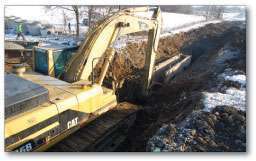 Jones prefers to subcontract deep digs such as this project involving tunneling beneath a section of Interstate.
Jones prefers to subcontract deep digs such as this project involving tunneling beneath a section of Interstate.“Each Monday we hold a weekly Toolbox Safety Talk covering a variety of topics dealing with everything from inspection of excavations for potential risks to choosing the proper personal safety equipment,” Jones says. “Our supervisors are ultimately accountable for the actions of all employees on their respective jobsites. We want each employee to safely return home to his family.” Jones says having his own sons on the jobsites probably adds to his keen interest in safety.
Jones still often meets at the nearby Bob Evans restaurant to talk business, politics, and cattle over breakfast with a group of old friends. “I’m 58 and I still have a lot of the same friends from high school,” he says. “But I think family is where it starts. If you can’t get along with your own family, you’re not going to get along with 50 employees.” EW



